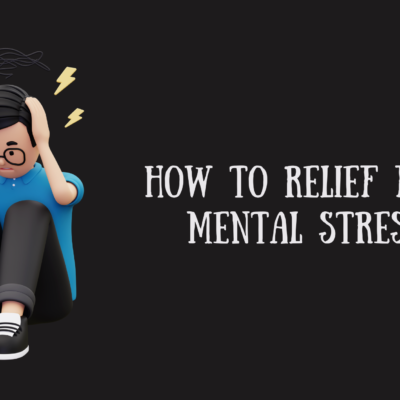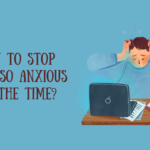How to Relief from Mental Stress: Mental stress has become an unavoidable part of modern life. Work pressure, personal responsibilities, financial challenges, and unexpected life events can all contribute to stress. While a certain level of stress is normal and even necessary for motivation, excessive or prolonged stress can negatively affect mental and physical health. Therefore, managing stress effectively is essential for overall well-being.
In this guide, we will explore various practical strategies to relieve mental stress and regain a sense of peace and balance in life.
Also Read:
Understanding Mental Stress
Before diving into stress relief techniques, it’s essential to understand what mental stress is.
What is Mental Stress?
Mental stress is a state of emotional or psychological strain caused by challenging situations. It occurs when a person perceives that the demands placed upon them exceed their ability to cope.
Common Causes of Stress
- Work Pressure – Tight deadlines, excessive workload, and job insecurity.
- Personal Issues – Relationship problems, family conflicts, or financial struggles.
- Health Concerns – Chronic illness, sleep deprivation, or an unhealthy lifestyle.
- Social and Environmental Factors – Traffic, noise pollution, or societal expectations.
- Uncertainty About the Future – Fear of failure, career instability, or unpredictable life events.
Symptoms of Mental Stress
- Constant worry and overthinking
- Irritability and mood swings
- Lack of motivation and concentration
- Sleep disturbances (insomnia or excessive sleep)
- Physical symptoms like headaches, fatigue, and muscle tension
Now that we understand stress and its causes, let’s explore effective ways to relieve it.
How to Relief from Mental Stress?
1. Practice Mindfulness and Meditation
Mindfulness involves being fully present in the moment, accepting thoughts and emotions without judgment. Meditation is a powerful way to cultivate mindfulness and reduce stress.
How to Practice Mindfulness Meditation
- Find a quiet place and sit comfortably.
- Close your eyes and focus on your breathing.
- Observe your thoughts without getting attached to them.
- Continue for 5–10 minutes daily.
Benefits of Meditation for Stress Relief
- Reduces anxiety and overthinking
- Improves focus and emotional stability
- Lowers blood pressure and enhances overall well-being
If sitting in silence isn’t your thing, guided meditation apps like Headspace or Calm can help.
2. Exercise Regularly
Physical activity plays a crucial role in relieving stress. Exercise releases endorphins, which are natural mood boosters.
Best Exercises for Stress Reduction
- Yoga – Combines breathing techniques and stretching to relax the mind.
- Walking or Running – Helps clear the mind and boost energy levels.
- Strength Training – Reduces stress hormones like cortisol.
- Dancing or Aerobics – A fun way to relieve tension and improve mood.
Even a 15-minute daily workout can significantly reduce stress levels.
3. Maintain a Healthy Diet
What you eat affects your mood and stress levels. A well-balanced diet helps regulate hormones and improves brain function.
Foods That Reduce Stress
- Dark Chocolate – Boosts serotonin levels.
- Green Leafy Vegetables – Rich in magnesium, which helps relax muscles.
- Nuts and Seeds – Contain healthy fats and antioxidants.
- Fruits Like Bananas and Berries – Provide essential vitamins for brain health.
Foods to Avoid
- Caffeine – Can increase anxiety and disrupt sleep.
- Processed Foods – High in sugar and unhealthy fats, leading to mood swings.
- Alcohol – Can worsen stress in the long run.
Eating fresh, whole foods helps maintain a balanced mood and reduces stress.
4. Get Enough Sleep
Lack of sleep worsens stress and makes it harder to cope with daily challenges.
Tips for Better Sleep
- Stick to a regular sleep schedule (same bedtime and wake-up time).
- Avoid screens (mobile, TV, laptop) at least 30 minutes before bedtime.
- Create a calm bedtime routine (reading, light stretching, or meditation).
- Keep your bedroom dark, quiet, and cool for better sleep quality.
A 7–9 hour sleep cycle is essential for a refreshed and stress-free mind.
5. Engage in Relaxing Activities
Taking time to enjoy hobbies and leisure activities helps shift focus away from stress.
Relaxation Techniques
- Listening to Music – Soft, calming music can ease tension.
- Reading Books – A great way to escape from stress and improve mental clarity.
- Art and Creativity – Painting, sketching, or writing can be therapeutic.
- Gardening – Spending time in nature promotes relaxation.
Engaging in activities that bring joy can help reset the mind and reduce stress levels.
6. Talk to Someone You Trust
Keeping stress bottled up can make it worse. Talking to a friend, family member, or therapist can help release emotional burden.
How Talking Helps
- Provides emotional support and validation.
- Offers different perspectives on problems.
- Helps vent out feelings instead of suppressing them.
If stress becomes overwhelming, seeking professional counseling is highly recommended.
7. Practice Deep Breathing Techniques
Breathing exercises can instantly calm the nervous system and reduce stress.
How to Do Deep Breathing
- Inhale deeply through the nose for 4 seconds.
- Hold the breath for 4 seconds.
- Exhale slowly through the mouth for 6 seconds.
- Repeat this cycle for 5 minutes.
Regular deep breathing improves oxygen flow to the brain, promoting relaxation.
8. Manage Time Effectively
Poor time management can lead to stress and frustration. Learning how to prioritize tasks can make life easier.
Time Management Tips
- Make a To-Do List – Plan tasks for the day to avoid last-minute stress.
- Set Priorities – Focus on important tasks first.
- Avoid Multitasking – Doing one thing at a time increases efficiency.
- Take Breaks – Short breaks prevent mental exhaustion.
Organizing daily tasks helps create a sense of control and reduces stress.
9. Spend Time in Nature
Nature has a calming effect on the mind. Taking a walk in the park, hiking, or simply sitting under a tree can boost mood and lower stress hormones.
Benefits of Nature Therapy
- Reduces anxiety and depression
- Improves concentration and creativity
- Increases feelings of happiness and peace
Spending at least 30 minutes outdoors daily can greatly improve mental health.
10. Limit Social Media and Screen Time
Excessive use of social media can increase stress by exposing people to negative news, unrealistic expectations, and online arguments.
How to Reduce Digital Stress
- Set screen time limits and take regular breaks.
- Avoid checking social media first thing in the morning.
- Engage in real-life activities rather than spending hours online.
Reducing screen time helps the brain relax and improves overall well-being.
Final Thoughts
Stress is a natural part of life, but learning how to manage it effectively can improve both mental and physical health. Incorporating meditation, exercise, proper sleep, healthy eating, and relaxation activities into daily life can significantly reduce stress levels.
It’s important to listen to your body and mind, seek support when needed, and make time for self-care. With the right approach, stress can be managed, allowing you to lead a happier and healthier life.








